Drug-Resistant Epilepsy and Mortality-Why and When Do Neuromodulation and Epilepsy Surgery Reduce Overall Mortality
September 19, 2022
Abstract found on Wiley Online Library
Patients with drug-resistant epilepsy suffer from an increased mortality rate, with the majority of deaths being epilepsy-related and 40% due to sudden unexpected death in epilepsy (SUDEP). Impact of epilepsy surgery on mortality has been investigated since the 1970s, with increased interest in this field during the past 15?years.
We systematically reviewed studies investigating mortality rate in patients undergoing epilepsy surgery or neuromodulation therapies. Quality of available evidence proved heterogenous and often limited by significant methodological issues. Peri-operative mortality following epilepsy surgery was found <?1%. Meta-analysis of studies that directly compared patients who underwent surgery to those not operated following presurgical evaluation showed that the former have a two-fold lower risk of death and a three-fold lower risk of SUDEP than the latter (Odds ratio (95% CI): 0.40 (0.29-0.56, p<0.0001) for overall mortality and 0.32 (0.18-0.57, p<0.001) for SUDEP). Limited data are available regarding the risk of death and SUDEP in patients undergoing neuromodulation therapies, though some evidence indicate that vagus nerve stimulation might be associated with lower risk of SUDEP.
Several key questions remain to be addressed in future studies, considering the need to better inform patients about the long-term benefit-risk ratio of epilepsy surgery. Dedicated long-term prospective studies will thus be required to provide more personalized information on the impact of surgery and/or neuromodulation on the risk of death and SUDEP.






